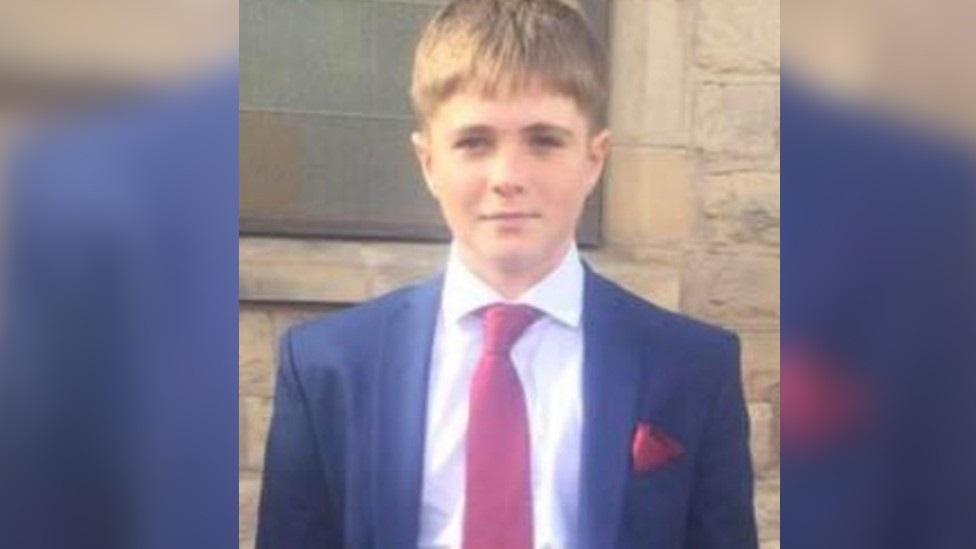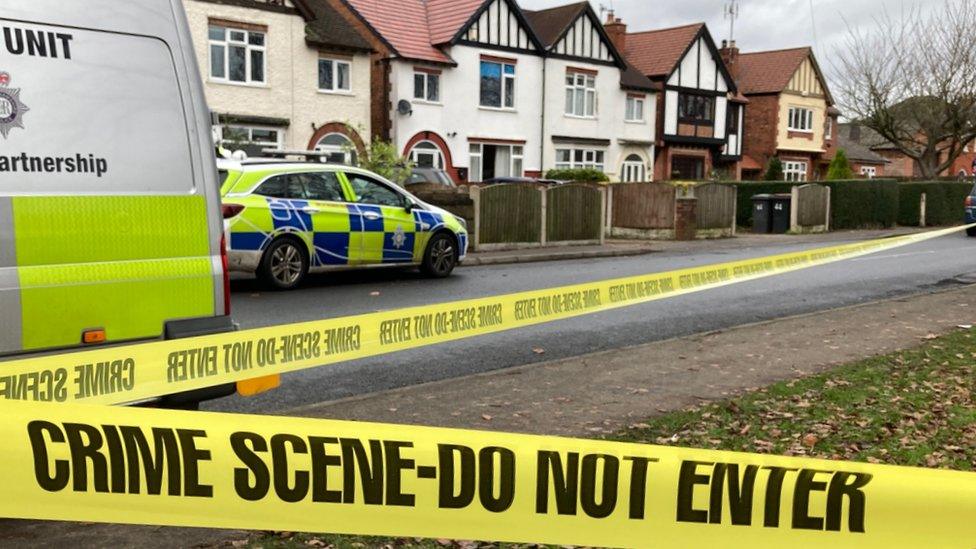Joe Whitchurch: Inquest finds no issues with care for stabbing victim
- Published

Joe Whitchurch was found stabbed at a house in the early hours of 26 December
Emergency staff did all they could to help save a teenager who was stabbed, a coroner has concluded.
Joe Whitchurch, 16, suffered a chest wound, piercing his heart, at a house in Stapleford, Nottinghamshire, in the early hours of 26 December 2020.
The inquest was called after a doctor raised concerns with the treatment he received before arriving at hospital.
However Nottingham's assistant coroner said she was satisfied there were no issues or omissions of medical care.
Surgeon Adam Brooks asked for an investigation into Mr Whitchurch's care and that of another stabbing victim, Ezekiel Clarke, who received treatment by the side of the road.
Mr Brooks said he had questions around the pre-hospital treatment and whether a delay in arriving at hospital could have been avoided.
The inquest had heard Mr Whitchurch had suffered a cardiac arrest at the scene and again in the ambulance on the way to hospital.
The hearing was told the ambulance stopped for more than three minutes while staff from The Air Ambulance Service (TAAS) carried out a procedure known as a resuscitative thoracotomy, where the chest is opened up.
However, Mr Brooks argued the ambulance had been just two minutes away from the hospital and should have carried on to the Major Trauma Centre where staff were waiting with specialist equipment and additional blood.

Emergency services were called to a house in Hickings Lane, Stapleford, in December 2020
Dr Gareth Moncaster, who was asked to independently review the case, said it was difficult to decide what the ambulance team should have done.
"The pre-hospital team did exactly what they were supposed to do at exactly the time they were supposed to do them and give Joe the best chance of life they could possibly have given him, and I'm in no doubt about that," he said.
The inquest heard doctors in the ambulance had not been aware of their location or distance from the hospital.
Dr Moncaster suggested, in future, ambulance teams could use a "stop moment" similar to a method used in surgery where drivers could inform those in the back when they are five or three minutes away from hospital.
"And from that point on you don't stop for anything and make your way straight to the Major Trauma Centre," he added.
'Extremely challenging'
Dr Moncaster said the procedure would have been a "last ditched life-saving effort" and believes doctors "did what felt right for [them] at the time".
Assistant coroner, Elizabeth Didcock, said it had been "extremely challenging" to "make a finding in this case as to which option would have been better".
"Whatever the decision, it sadly did not make a difference to Joe," she added.
"Overall I am clear that there are no issues of care, no omissions of medical care that have caused or contributed to Joe's death on a balance of probability."
Ms Didcock welcomed Dr Moncaster's suggestion of a "stop moment" being used by ambulance crews and said a national trial was looking at resuscitative thoracotomy procedures to "provide evidence to support clinical decision-making by pre-hospital teams".
She said TAAS and EMAS had also agreed to review their processes and improve working with colleagues on pre-hospital care, and that Mr Brooks would be hosting a conference and training event in the summer for teams to review evidence on carrying out a resuscitative thoracotomy in emergency situations.
Jake Rollinson, 20, of Hickings Lane, Stapleford, has been convicted of Mr Whitchurch's murder and Lorna Richardson, 25, of Blake Road, Stapleford, pleaded guilty to committing an act with the intent to prevent the course of justice.
They will both be sentenced on Friday.

Follow BBC East Midlands on Facebook, external, Twitter, external, or Instagram, external. Send your story ideas to eastmidsnews@bbc.co.uk.
Related topics
- Published23 February 2022

- Published1 December 2021

- Published7 September 2021

- Published1 September 2021
